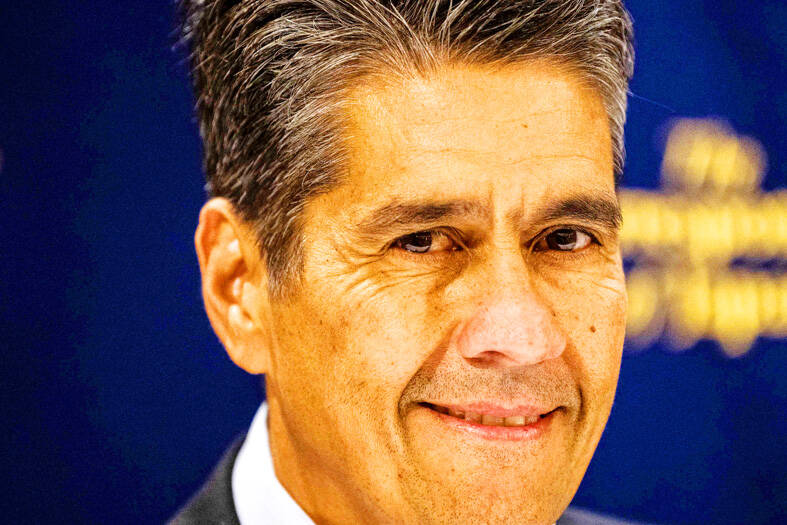Palauan President Surangel Whipps Jr yesterday claimed victory in national elections, keeping the pro-US leader in power as China seeks greater influence across the Pacific.
Over his four years in office, Baltimore-born Whipps has overseen the swift expansion of US military interests across the Palauan archipelago. The Melanesian microstate of about 20,000 people is one of the few remaining countries to maintain diplomatic links with Taiwan, a posture that has angered China over the years.
“I am deeply humbled by the trust you have once again placed in me,” Whipps said in a statement. “Your decision to grant me a second term as president is a responsibility I hold with the utmost respect.”

Photo: AFP
Whipps’ sole rival for the presidency was his brother-in-law, Tommy Remengesau Jr. Preliminary results released by the Palau Election Commission showed Whipps garnered more than 4,300 votes, against just more than 3,100 for Remengesau. Some overseas ballots are still being counted.
Remengesau, himself a former president, is also pro-Taiwan, but has cautioned that drawing too close to Washington could paint a target on Palau’s back.
Whipps said he would now focus on bolstering Palau’s inflation-battered economy and stepping up environmental protections.
Palau’s economy has struggled to recover from an ongoing diplomatic spat with China. In 2017, China unofficially banned its nationals from visiting tourism-dependent Palau, after it refused to break with Taiwan and forge links instead with Beijing. Deprived of tens of thousands of Chinese visitors each year, Palau has struggled to find other sources of jobs and cash.
“I know the challenges we face are significant, but so are the opportunities,” Whipps said. “We have made strides in preserving our environment, strengthening our economy and improving the lives of all Palauans.”
Whipps has overseen the ongoing construction of a long-range US radar system based in Palau, a tropical archipelago of limestone islands and coral atolls about 800km east of the Philippines. He also mooted further buttressing the nation with US-made “Patriot” missile defenses, an idea that stalled after it was rejected by other lawmakers.
“I always say that presence is deterrence,” the 56-year-old has said previously.
Whipps has also been a persistent China skeptic, accusing Beijing of meddling in the presidential vote and orchestrating hacks of government computers. Meanwhile, Remengesau, 68, has criticized the lack of transparency surrounding these US military deals, cautioning that tiny Palau should not risk China’s ire by giving Washington free rein.
Kathryn Paik, a former Pacific expert on US President Joe Biden’s National Security Council, said “heavy bi-partisan” support for Palau would likely continue throughout Donald Trump’s incoming administration.
Strong ties with Palau gave Washington “unilateral defense access across a critical swathe of the northern Pacific,” she said.

Indonesia and Malaysia have become the first countries to block Grok, the artificial intelligence (AI) chatbot developed by Elon Musk’s xAI, after authorities said it was being misused to generate sexually explicit and nonconsensual images. The moves reflect growing global concern over generative AI tools that can produce realistic images, sound and text, while existing safeguards fail to prevent their abuse. The Grok chatbot, which is accessed through Musk’s social media platform X, has been criticized for generating manipulated images, including depictions of women in bikinis or sexually explicit poses, as well as images involving children. Regulators in the two Southeast Asian

COMMUNIST ALIGNMENT: To Lam wants to combine party chief and state presidency roles, with the decision resting on the election of 200 new party delegates next week Communist Party of Vietnam General Secretary To Lam is seeking to combine his party role with the state presidency, officials said, in a move that would align Vietnam’s political structure more closely to China’s, where President Xi Jinping (習近平) heads the party and state. Next week about 1,600 delegates are to gather in Hanoi to commence a week-long communist party congress, held every five years to select new leaders and set policy goals for the single-party state. Lam, 68, bade for both top positions at a party meeting last month, seeking initial party approval ahead of the congress, three people briefed by

The Chinese Embassy in Manila yesterday said it has filed a diplomatic protest against a Philippine Coast Guard spokesman over a social media post that included cartoonish images of Chinese President Xi Jinping (習近平). Philippine Coast Guard spokesman Jay Tarriela and an embassy official had been trading barbs since last week over issues concerning the disputed South China Sea. The crucial waterway, which Beijing claims historic rights to despite an international ruling that its assertion has no legal basis, has been the site of repeated clashes between Chinese and Philippine vessels. Tarriela’s Facebook post on Wednesday included a photo of him giving a

ICE DISPUTE: The Trump administration has sought to paint Good as a ‘domestic terrorist,’ insisting that the agent who fatally shot her was acting in self-defense Thousands of demonstrators chanting the name of the woman killed by a US federal agent in Minneapolis, Minnesota, took to the city’s streets on Saturday, amid widespread anger at use of force in the immigration crackdown of US President Donald Trump. Organizers said more than 1,000 events were planned across the US under the slogan “ICE, Out for Good” — referring to the US Immigration and Customs Enforcement, which is drawing growing opposition over its execution of Trump’s effort at mass deportations. The slogan is also a reference to Renee Good, the 37-year-old mother shot dead on Wednesday in her